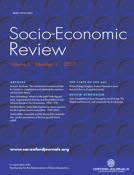-
Views
-
Cite
Cite
Bruce E. Kaufman, The institutional economics of John R. Commons: complement and substitute for neoclassical economic theory, Socio-Economic Review, Volume 5, Issue 1, January 2007, Pages 3–45, https://doi.org/10.1093/ser/mwl016
Close - Share Icon Share
Abstract
In this paper I outline the theory of institutional economics developed by John R. Commons and contrast it with neoclassical economic theory. Key concepts in Commons' theory are bounded rationality, property rights, working rules, institutions, transactions and incomplete contracts. Although Commons' writings tend toward the obscure and descriptive, I demonstrate that on a deeper level of analysis his ideas and concepts provide the basis for an alternative body of economic theory. In certain respects, this body of theory complements neoclassical theory by fleshing-out the institutional infrastructure that governs and regulates market exchange. In other respects, however, Commons' theory of institutional economics is a heterodox substitute for neoclassical theory because it is built using a different methodology, replaces or modifies central theoretical pillars of neoclassical theory, and denies the validity of the ‘Invisible Hand’ theorem and other core neoclassical propositions. Commons' institutional economics also provides a theoretical framework for an integration of the economic and social dimensions of human behaviour.




